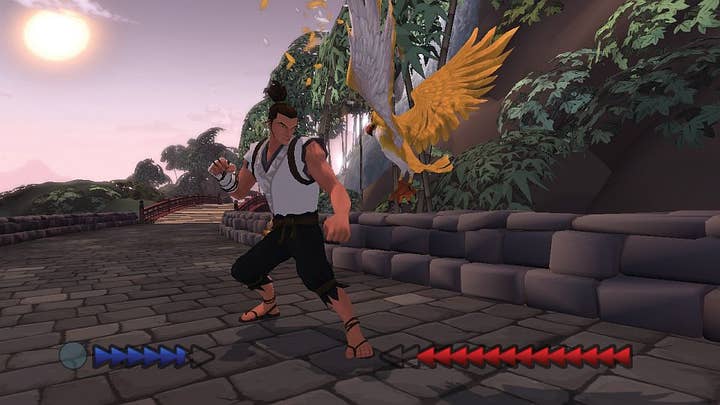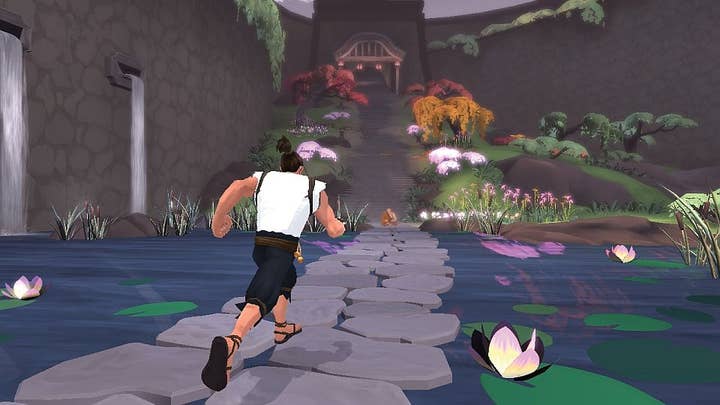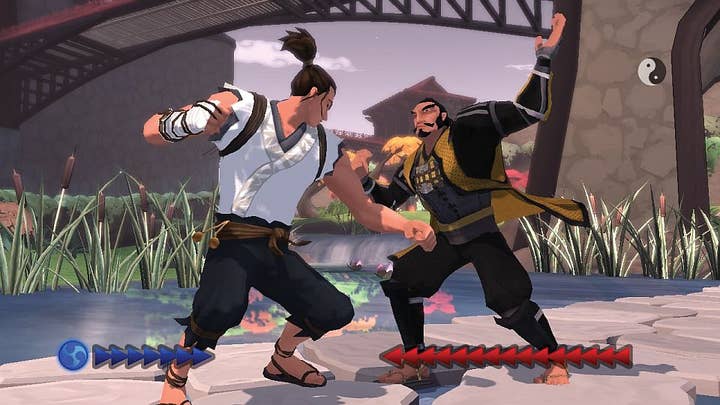Jordan Mechner, Karateka and the gaming renaissance
From Apple II to Apple iOS, the game designer reboots a classic for the digital era
Karateka, the classic Apple II game is being reinvented for new platforms by designer Jordan Mechner, most famous for his Prince of Persia games. Originally created by Mechner in his Yale dorm room nearly 30 years ago, the fighting game became a number one bestseller, influencing a generation of gamers with its rotoscoped animation and cinematic cutscenes. Now with the help of artist Jeff Matsuda (Batman: The Animated Series) and music by Grammy-winning composer Christopher Tin (Civilization IV), Karateka is being reborn on digital formats.
GamesIndustry International talked to Mechner about the reinvention of a classic, and how the game industry has changed since the first version appeared.
Why redo Karateka after all this time? "It's been 30 years since I first started making it on the Apple II and in all that time it's never had a sequel or a remake,” says Mechner. “Whereas my next game, Prince of Persia, I had the chance to revisit it so many times in so many different media. It felt like it was time. The new digital download platforms and mobile platforms like iOS are really perfect for a smaller game like Karateka.
"Just because of the original game design, I didn't want to make it into a huge, sprawling retail console franchise. It just felt like doing it small was the right way to do it. It just seemed like a lot of things aligned.”
"We put together a small team so we wouldn't have the immense pressure to go bigger that comes with a retail console title"
Jordan Mechner
Karateka is due for Xbox Live Arcade, PSN and Steam, as well as iOS (iPhone 4s and 5, and iPad 2 or 3), but Mechner's not sure which platform will be the most successful. “I honestly don't know,” he says. “The XBLA, PSN and Steam versions are really all the same game, so it's a question of what platforms people have and what they feel most comfortable playing. I think it works equally well on all of them.”
“The iOS version is a little different; we simplified it and gave it a one-touch interface,” Mechner explains of the differences between the formats. “There are a lot of casual games that offer a quick fix, and there are bigger console games that offer a more in-depth, cinematic immersion in a human story. I haven't really seen any games on iOS that are compact and that you can easily play, and also have that cinematic story. That's really what Karateka is. I'll be curious to see how it does on the various platforms.”
Mechner believes Karateka is an unusual design, one that will attract a broader audience. “It's not a fighting game in the sense of trying to rack up points, or fighting for fighting's sake. It's fighting in order to get to the happy ending in the story, and it's a love story. I think we're appealing to a slightly different audience than most fighting games,” he says.

He continues, “We wanted the new Karaketa to go beyond only people who remembered the original game. It's a romantic story, it's got this atmospheric setting of medieval Japan, it's got a lot of human interest. It's not extremely violent the way some fighting games are, so it's good for kids, good for families. I hope that people who played it on the Apple II and revisit it now, it's something that their kids and families will be able to enjoy as well.”
The game's controls are much simpler than many games, which Mechner believes will help appeal to more casual gamers. “We've taken a new approach to the combat,” Mechner explains. “It's not the kind of fighting game where you've got a lot of different buttons and combinations. It's a rhythm fighting gameplay, where the enemy attacks and you have to block their attacks in rhythm, and the music helps you do this. Once you block the attack, you then earn the counter-attack and you get to pound on the enemy.”
Mechner hopes new players will be able to get into the game quickly. “It's simple, easy enough that anyone can pick this up even if you don't play fighting games, and start enjoying it and having fun immediately. It's also something that the more you play the better you get at it, so it really rewards mastery. This is also something that's really well-suited to the touch-screen interface. On the console game we use three buttons; it's still pretty simple by fighting game standards. On iOS it's just one touch, so it's well suited to either the iPhone or the iPad.”
Mechner's long history in the game industry gives him perspective to see the changes that have occurred. “The game industry has gotten lot bigger since I was making Karateka on an Apple II,” Mechner reminisces. “Teams have gotten a lot bigger, marketing budgets have gotten bigger. I'm really excited by what's happened in the last few years. Even as games have gotten bigger than ever, there's been a renaissance of small games thanks to mobile and digital download platforms. In a lot of ways it feels like the industry's come full circle, and it's probably easier now than it has been at any time in the last twenty years for one person or a small team to make something that reaches a large audience and has an impact. The classic example, of course, being Minecraft. There are plenty of other titles, too, that illustrate that.”
"There's another kind of innovation that can happen with small teams, where you can really experiment with types of gameplay, ways of merging story and action that haven't been proven"
Jordan Mechner
Are there directions in game design Mechner feels haven't been taken on these platforms? “Absolutely. I've always been especially interested in storytelling games. Karateka and Prince of Persia are action games, but they're action games where the story is very important. Back in the eighties and early nineties, we had a thriving adventure game genre, games that were really about the story, and I see some interesting signs that might be due for a renaissance as well. We just re-released on iOS my game The Last Express, which was a CD-ROM adventure game I did in 1997 for PC. There are very few games on iOS that really tell a big, ambitious story the way that it once seemed adventure games were going. I think that's an interesting direction.”

Mechner thinks interesting things can be done with smaller teams and smaller budgets. “That's really what we set out to do with Karateka,” Mechner said. “With Prince of Persia games we worked with Ubisoft, which is a big publisher. With Karateka we put together a small team so we wouldn't have the immense pressure to go bigger that comes with a retail console title. The technology and tools have advanced to the point where it really is possible for a small team to do something that looks and sounds and plays great.”
Mechner likes the freedom of a smaller team. “There is a kind of technological innovation that's best suited to large teams, when you have the resources to push something further than anyone else has,” he says. “But there's another kind of innovation that can happen with small teams, where you can really experiment with types of gameplay, ways of merging story and action that haven't been proven. When you try something that hasn't been proven, it's experimental; you can't be sure that it's going to work and the audience is going to embrace it. But that's where the most interesting new developments can come from.”









